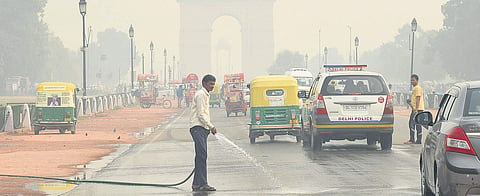

NEW DELHI: The air quality in the national capital took a hit on Wednesday as the overall AQI inched closer to the severe-plus emergency category. Increased stubble burning, drop in the temperature and slow wind speed are been blamed for the jump in the pollution levels.
As per System of Air Quality and Weather Forecasting And Research (SAFAR), the overall Air Quality Index (AQI) of Delhi was 472 while the Central Pollution Control Board (CPCB) recorded an AQI near 500 in most of areas of the city.
In the south and central Delhi, five areas checked randomly by The Morning Standard showed an AQI above 440. The recorded AQI of ITO was 470, Lodhi Road 447, Mandir Marg 466, Jawahar Lal Nehru Stadium is 471 and Nehru Nagar 488. The outer areas also neared the emergency mark of 500 with Ashok Vihar at 480, Jahangirpuri at 488, Rohini at 491 and Mundka at 484.
ALSO READ | Explore feasibility of hydrogen-based Japanese tech to fight air pollution: SC to Centre
An AQI between 0-50 is considered “good”, 51-100 “satisfactory”, 101-200 “moderate”, 201-300 “poor”, 301-400 “very poor”, and 401-500 “severe”. Above 500 is “severe-plus or emergency” category.
The air quality condition is likely to marginally improve by 15 November but reasonable improvement to the very poor is expected only by 16 November.
“The approaching fresh Western Disturbance exists as a cyclonic circulation over Afghanistan & neighbourhood and likely to affect northwest India in next two days which is likely to increase wind speed at Delhi by 15 November and start to improve the air quality,” the SAFAR said.
Meanwhile, the Environmental Pollution (Prevention and Control) Authority ( EPCA) has directed all hot mix plants, stone crushers and coal and other fuel-based industries in neighbouring areas of Faridabad, Gurugram, Sonepat, Panipat, Ghaziabad, Noida and Greater Noida.